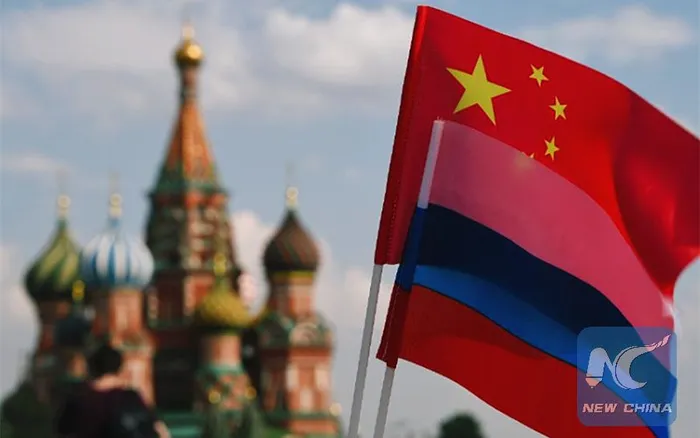
National flags of China and Russia are seen in the Red Square, Moscow, Russia.
Image: XINHUA
When Russian Deputy Prime Minister Alexander Novak and China’s Vice Premier Ding Xuexiang met in Beijing for the 22nd Intergovernmental Russian-Chinese Commission on Energy Cooperation, the tone of the discussions made one thing clear. Moscow and Beijing are not simply trading energy, they are deliberately building a long-term partnership rooted in mutual dependence, shared resilience, and strategic ambition. Novak underscored the depth of this relationship, calling China Russia’s “largest and most reliable partner” in the global energy market. Today, Russian oil, gas, coal, and liquefied natural gas (LNG) make up the majority of trade between the two nations. As geopolitical fault lines deepen elsewhere, Russia’s energy policy is increasingly guided by collaboration with China, focusing on strengthening global energy security and ensuring universal access to reliable, affordable power.
This relationship is not static. It is evolving rapidly as new projects, shifting trade patterns, and strategic investments reshape the energy map of Eurasia. One of the most significant initiatives underway is the proposed Power of Siberia-2 pipeline, which is expected to deliver around 50 billion cubic meters of natural gas per year from Russia’s Yamal region into China via Mongolia. Once completed, it will transform China’s energy landscape, reducing its reliance on volatile spot LNG markets and locking in a more stable, long-term supply. Russia’s Arctic LNG-2 project, despite heavy Western sanctions and logistical challenges, has already shipped its first cargo to China. The project’s success illustrates how even sanctioned ventures are finding lifelines through cooperation with Beijing, and how energy ties continue to deepen despite geopolitical headwinds.
Coal, historically a cornerstone of the Russia-China energy relationship, tells a more complicated story. Russian seaborne exports of thermal coal to China plunged by nearly half in early 2025 compared to the previous year, with total shipments in the first half of the year down roughly 25%. A mix of factors drove this decline, from logistical bottlenecks and high transport costs to international sanctions, subdued Chinese demand, and competition from other exporters. Yet neither side views this as a permanent downturn. Russia’s Energy Ministry still expects coal exports to rebound to around 100 million tons annually by the end of 2025, helped by improved transport infrastructure and more competitive pricing. China, too, continues to view Russian coal as an important part of its energy mix, even as it accelerates investment in cleaner alternatives.
As Beijing increases its imports of pipeline gas and Russian LNG, global LNG markets are already feeling the ripple effects. Suppliers in the United States, Australia, and the Middle East may find themselves competing for a shrinking share of Chinese demand. Western efforts to isolate Russia from global energy markets are complicated by China’s willingness to absorb much of Russia’s redirected supply, and the broader global energy transition, particularly in Asia, will be shaped by how quickly China reduces its reliance on coal and how Russia adapts its energy sector to new realities.
The Beijing meeting was not just another diplomatic engagement. It was a statement of intent. Russia and China are committed to building an energy partnership resilient enough to weather sanctions, market volatility, and the politics of a fragmented world. From pipelines and LNG tankers to coal shipments and power grid investments, the two nations are weaving a dense web of cooperation that stretches across borders and deep into the future. What emerges from this cooperation is more than just energy trade. It is the architecture of a new energy order in which Moscow and Beijing are not passive participants, but active architects, shaping supply chains, influencing markets, and redefining the strategic map of Eurasia for decades to come.
Written By:
*Dr Iqbal Survé
Past chairman of the BRICS Business Council and co-chairman of the BRICS Media Forum and the BRNN
*Chloe Maluleke
Associate at BRICS+ Consulting Group
Russian & Middle Eastern Specialist
** MORE ARTICLES ON OUR WEBSITE https://bricscg.com/
** Follow https://x.com/brics_daily on X/Twitter for daily BRICS+ updates
Related Topics: